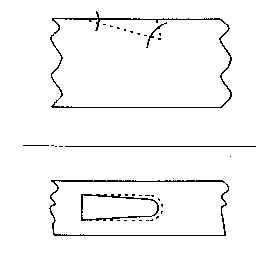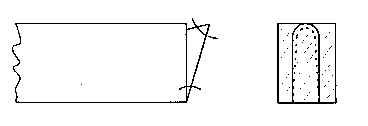The
invention
- The
problem to be solved:
To make a new
binding system
|
- Definition:
The invention is a connecting
element, previously unknown, made up of a
rabbet and a tenon.
|
- Presentation:
In a traditional sense is the
invention the 21 century version of the
ancient cotter, substituting for nails
and wood-screws.
A significant advantage of the invention
over traditional jointing methods is its
self-pressing cotter-effect. For example:
When assembling a door no pressing device
is needed and there is no waiting for the
glue to bind. The assembling time of a 30
m2 (square meter) wooden house could be
reduced by ca 50 %. The invention may
score its greatest success in building
family houses because no mortar is
required.
When assembling several architectural
parts the direction, width and depth of
the rabbet will be shaped considering the
proper order of succession and the
loading conditions. Extrancous tenons are
expected to be the most effective.
This jointing method can be applied in
the case of all solids.
  
|
- Application:
The invention can be applied in several
branches of industry, for example : wood
industry, toy industry, space research,
machine industry, potter’s craft,
building industry etc.
|
- Advantages:
The adoption of the method increases
effectiveness and lowers costs in the
fields of production and assembly.
-accurate, exact, quick and steady
assembling of objects, architectural
parts
-cheap: mass
production is possible, only the borings
to the tenons are labour- intensive: the
result is a pressing join
|
- Stage
of development: the prototype is
completed
|
- Documentation
available: Yes
|
The
inventor(s)
- Self
introduction:
He is 46 years old. He is living Mohács.
|
The
protection
- Form:
PCT
application
- Priority:
- Countries
where it is force: Hungary
|
Business
intention: Looking
for investors, licensing
|
| Contact
|